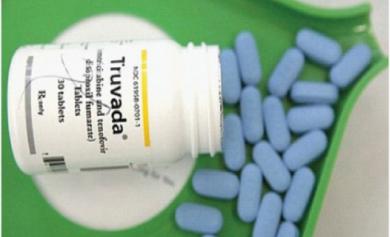
A once-a-day pill could be used to prevent the spread of HIV, according to two new studies.
Researchers have discovered that a drug which has been widely used since the 1990s could provide protection for up to 73 per cent of heterosexuals.
The discovery has been hailed as a ‘tipping point’ in the fight against the disease.
And the drugs – Truvada and Viread – which are available in generic form cost as little as 15pence each.
The studies involved more than 5,000 couples in three African countries – Kenya, Uganda and Botswana – where one partner was HIV-positive and the other not.
Researchers found that the rate of infection for the HIV-negative partner taking the Aids medication daily fell by 60 per cent.
While for those taking Truvada, a mix of tenofovir and emtricitabine, the rate of infection was 73 per cent lower than normal.
Similarly, a study involving over 1,200 people in Botswana found that those taking Truvada daily reduced their risk of HIV infection by 62.6 per cent.
Truvada has in the past 12 months also been shown to reduce the rates of infection in gay men.
The findings are the latest information to suggest that the Aids pandemic may be contained by the use of drugs.
In the past, prevention attempts centred on changing sexual behaviour by promoting condom use and reducing the number of intimate partners.
Aids has claimed almost 30 million lives in the three decades since it was first diagnosed.
Margaret Chan, director general of the World Health Organisation, said, “These studies could have enormous impact in preventing heterosexual transmission.’
Michel Sidibé, executive director of UNAIDS, the Joint United Nations Programme on HIV/Aids, said, “This is a major scientific breakthrough. These studies could help us to reach the tipping point in the HIV epidemic.”
According to UNAIDS only HIV/Aids 6.6 million of the 15 million HIV-positive who need drug treatment are getting it.
Last year funding for HIV/Aids fell for the first time for the world’s poorest countries.
Anthony Fauci, director of the US National Institute of Allergy and Infectious Diseases, said, “As we get more scientific data, the ability to contain the epidemic by multiple weapons gets better and better. Major investment now will save even greater expenditure in the future.
“For the first time in the history of HIV/Aids, controlling and ending the pandemic are feasible.”
Drug treatment, according to scientists, would not be appropriate for everyone because of the risk of side effects and cost.
The drug as a preventative treatment would be cost-effective, they claim, for sex-workers.
One of the studies was funded by the Bill & Melinda Gates Foundation.
The foundation’s director of HIV and Tuberculosis, Stefano Bertozzi, said it was “a significant milestone in the quest to develop new HIV prevention measures.”
–Daily Mail, London
?

